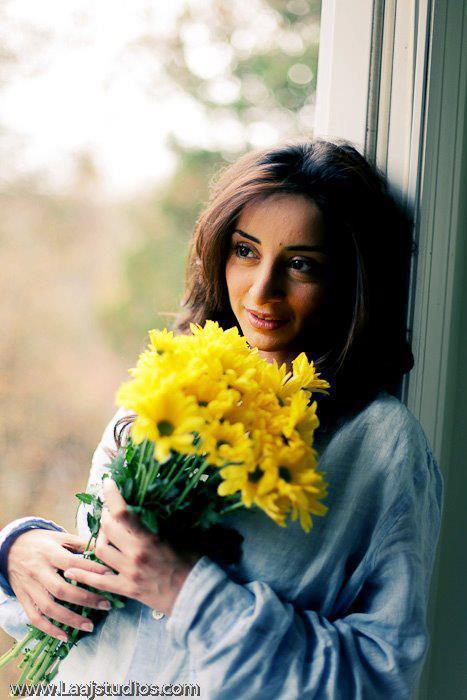While Indian television continues to swim in recycled cliches, Pakistan since the seventies, has been enriched by its emotive and powerful women story tellers. Most notably Haseena Moin who wrote great dramas and scripts for the stage, radio and television and is till date considered a pathbreaker.
Some of her popular dramas include Ankahi, Tanhaiyaan, Kiran Kahani, Dhoop Kinaray, Aahat, Uncle Urfi, Shehzori, Kohar, Des Pardes, Pal Do Pal, Aansoo, Kasak, Parchaiyan and Parosi.
Though Moin didn’t write novels or short stories, she paved the way for other women like Farhat Ishtiaq whose novel Mata-e-Jaan Hai Tu was televised in 2012 in Pakistan successfully and is now being screened on Zee Zindagi as Meri Jaan Hai Tu.
The story with almost sublime simplicity depicts the connection between the characters played by Sarwat Gilani and Adeel Hussain.
The magic we see on TV can possibly be attributed to the talent and emotional investment of the actors but most of it comes from Farhat who conjures perfect water colour studies of autumn trees as she paints in gentle strokes, the love between one Haniya Sajjad and Aabi (Adeel Hussain) who meet at Columbia University and a few minor misunderstandings later, fall deeply in love and flow into each other’s life seamlessly.
We see them in New York’s streets, gardens, in coffee shops talking about their lives and developing an emotional intimacy that extends to Haniya’s ailing grandmother whose last wish is to see the two married.
Her urgency stems from the fact that Haniya lost her parents in a car crash not too long ago and needs an anchor to find her bearings.
The plot so far is not unusual but it is the tenderness in the dialogue and the seemingly meaningless exchanges that tell us a great deal about the characters.
Haniya who once worried about her best friend’s equation with her mother post an attachment to an American, does not realise that one day she will have to go through a trial by fire that will scorch her to the bare bones of her spirit.
Her dependence on Aabi post their sudden wedding and the charmed week she shares with him before he leaves for Pakistan to meet his parents, is almost too heartbreakingly beautiful to be true .
We learn via little gestures that Aabi is a man for whom love is an act of giving unreservedly without the intervention of ego and how for Haniya, it is about enjoying the flowers he brings, the food he cooks for her, knowing that some day, in some way, she will repay it all.
She will give, whatever it is that she is capable of giving and sure enough, a tragedy alters the course of her life. The way she heals post an upheaval makes this story about every human life. This is a love story where love is not just about tangible things but about living a commitment to someone we have loved, with all the honesty and purity we are capable of.
Farhat was born on June 23, 1980 in Karachi, Sindh and the references to engineering in Mata-e-Jaan could have come from the fact that she too studied civil engineering at the NED University of Engineering and Technology, Karachi. One of her books Hamsafar was televised too with Fawad Khan in the lead.
Another notable name on this list is of Umera Ahmad whose Zindagi Gulzar Hai was loved as much in India as it was in Pakistan. Ahmad was born on December 10, 1976 in Sialkot and began writing in 1998 and has written over 16 books, ranging from novels to short stories. Zindagi Gulzar Hai depicted the love story between two civil servants and she possibly mined her own personal life for inspiration as she married a civil servant.
There was a time when Indian TV serialised novels by Tagore, Sarat Chandra, Premchand, the stories of the greatest writers the world has ever known but in the late 90s, we lost sight of honest story telling. We lost the plot and then the tired plots lost us. Atleast now, we have stories from across the border to give us something more than just tired templates.
 with The New Indian Express Reema Moudgil works for The New Indian Express, Bangalore, is the author of Perfect Eight, the editor of Chicken Soup for the Soul-Indian Women, an artist, a former RJ and a mother. She dreams of a cottage of her own that opens to a garden and where she can write more books, paint, listen to music and just be silent with her cats.
with The New Indian Express Reema Moudgil works for The New Indian Express, Bangalore, is the author of Perfect Eight, the editor of Chicken Soup for the Soul-Indian Women, an artist, a former RJ and a mother. She dreams of a cottage of her own that opens to a garden and where she can write more books, paint, listen to music and just be silent with her cats.







the plot is simple but the freshness and the tenderness with which it is handled is very gud…and the characters and their honesty is worth it…the relationship between aabi and his parents is beautiful ..the regret of uzzair..huniya going all way to pak for the loving parents of her love tenderly touch your heart
I couldn’t resist adding to it the names of wonderful directors Sahira Kazmi behind the marvel of dhoop kinarey, Aahat and Mehreen Jabbar behind Mata-e-jaan hai tu. Have seen some of their interviews and what a gem of person they are.
Haseena Moin is infact the first original script-writer pakistan has had until then drama were only adaptive version of popular novels/play, which there is no derth of.